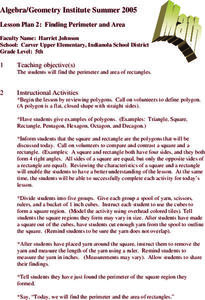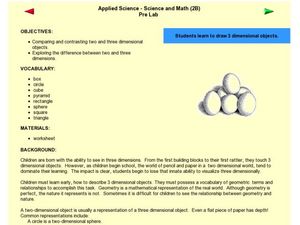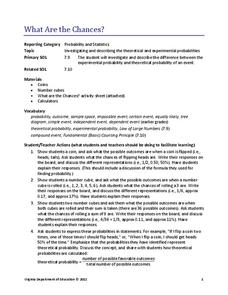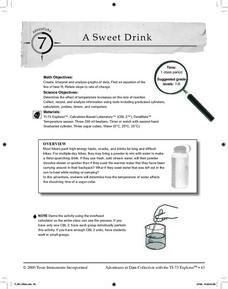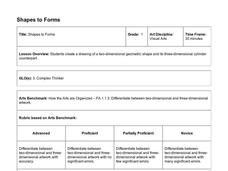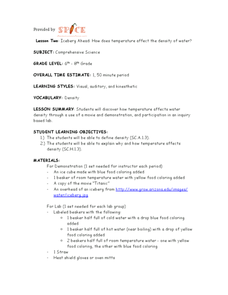Curated OER
Finding Volume
Sixth graders develop a rule for finding the volume of rectangular solids using colored cubes. They investigate the properties of solid figures and find the volume of an object by counting units. Students fill spaces with standard-sized...
Curated OER
Games for Probability: In-Class and Powerball Simulation
Your soon-to-be statisticians play a game to understand the difference between independent and dependent experiments and probability. They draw colored cubes from a bag and then, by either replacing the cube in the bag, or not, for each...
Curated OER
Finding Perimeter and Area
Geometers find the perimeter and area of rectangles. They discuss the definitions and characteristics of rectangles and squares. In groups, they use yarn to discover the perimeter of squares and rectangles. They count cubes to explore...
Curated OER
Draw 3 Dimensional Objects
Bring three-dimensional shapes to life in your classroom. First introduce the vocabulary of three-dimensional shapes, such as sphere, cube, and pyramid. Then, show your kids examples of how to use two-dimensional objects draw...
Virginia Department of Education
What Are the Chances?
Take a chance on an informative resource. Scholars conduct probability experiments involving coins and number cubes to generate data. Compiling class data helps connect experimental probability to theoretical probability.
Curated OER
A Sweet Drink
Learners investigate reaction rates. In this seventh or eighth grade mathematics lesson plan, students collect, record, and analyze data regarding how the temperature of water affects the dissolving time of a sugar...
Curated OER
Cross Sections
Young visual learners explore different cross sections of 3-dimensional objects. First, cross sections of cubes are explored by using an interactive flash activity. This is then extended by looking at cross sections of spheres,...
Curated OER
Finding Volume of Similar Figures
Upper elementary and middle schoolers examine the Volumes of Similar Figures. They investigate the relationship between corresponding sides and evaluate the volume of similar figures. Pupils record their findings on various activity...
Georgia Learning Connections
Stand By Me!
Get your little mathematicians moving with this experiential activity in which one child is the "tens" and another is the "ones." They collect the number of unifix cubes (in tens or singles) assigned to their respective place values and...
Curated OER
Discovering Math: Computation
Middle schoolers add, subtract, multiply, and divide rational numbers. They find the square and the cube of numbers. They create a game incorporating computation on rational numbers. Everyone works together to write and evaluate...
Curated OER
Pop-it...Stop-it
Students observe how certain geometric shapes can be used to make some structures rigid and others flexible. The activity involves construction of a 30-60 right triangle, folding while following directions, and identifying polygons.
Curated OER
The Day After Tomorrow: How is the Density of Water Related to Climate Change and Global Warming?
Science learners simulate what happens when ice breaks up and floats on water and how increased pressure on ice causes it to melt faster. They view a clip from the movie, The Day After Tomorrow, and relate their lab activities to what...
Curated OER
3-D Figures Part 1
Elementary schoolers explore 3-D shapes. They transition from thinking of shapes as only 2-D. Pupils read Cinderella as a launching activity for their upcoming adventure, and explore a new world of 3-D shapes in this introductory...
Curated OER
Physical Changes and States of Matter
Fourth graders identify a physical change as one that results in a change in size, shape, or state of matter. After an initial teacher-led discussion and demonstration, groups of students get together to perform an experiment which...
Curated OER
Volume of a Rectangular Prism
Children use the length, width, and height of an object to calculate the volume of a rectangular prism. They observe how to multiply three numbers at a time, and define volume. Pupils observe as the teacher demonstrates how to determine...
Curated OER
Seashore Explorers
There are three separate lessons within this resource that can be used together, or that can each stand alone. In the first, five simple activities allow junior scientists to examine the amazing properties of water. In the second, they...
Curated OER
Book Title: Ten Flashing Fireflies
This lesson engages learners in a variety of activities to build 1 to 1 correspondence, estimation, and problem solving skills. They discuss problem solving strategies, hear the story Ten Flashing Fireflies, compose their own word...
Curated OER
Shapes to Forms
Here is a math instructional activity that is really a visual arts instructional activity in disguise! In it, pupils utilize their knowledge of geometric shapes and forms to create a detailed version of a cylinder. The instructions on...
Curated OER
Investigation- I've Got It
Young scholars practice grouping skills by sorting footwear of the class as a whole group. Activity can be extended by having individual students sort a variety of colored items using a sorting mat.
Curated OER
A Honey of a Hexagon
Learners explore how bees make honey and why the hexagon is the best basic pattern for the honeycomb through the use of a video and hands-on activities with honeycombs and geometric shapes.
Curated OER
Net "Working"
Upper elementary and middle schoolers explore the properties of various polygons. They use video, resource links, and engage in hands-on activities in order to construct geometric nets. This fine plan should lead to increased...
Curated OER
Try Tessellation
Most middle schoolers probably feel that quilting is at best an activity left to their grandmothers. This instructional activity uses the Zome modeling system to get them to realize how shapes in quilting are really tessellations and...
Curated OER
Jessica's Aquarium
Sixth graders use problem solving strategies to determine the amount of gravel needed to fill the bottom of an aquarium that is 50 cm long, 20 cm wide, and 30 cm high. Students use centimeter cubes and brainstorm strategies they might...
Curated OER
Iceberg Ahead: How Does Temperature Affect the Density of Water?
Demonstrate how ice floats on water and get the class thinking about why icebergs are so deceiving. Investigators then experiment with mixing water of the same temperature and water of different temperatures. Make sure to explain the...
Other popular searches
- Writing Cubing Activities
- Cubing Activities English
- Cubing Activities as Review
- Cubing Activities in Health




